|
|
|
Sort Order |
|
|
|
Items / Page
|
|
|
|
|
|
|
| Srl | Item |
| 1 |
ID:
166561
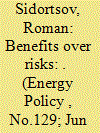

|
|
|
|
|
| Summary/Abstract |
Projected benefits serve as the driving force behind hydrocarbon development. Such benefits are analysed in conjunction with the risks posed by proposed oil and gas activities, leading to an ostensibly rational decision on whether to proceed with the development. This article explores the ways and extent to which government policies aimed at supporting the oil and gas sector affect the outcomes of decision-making processes regarding new hydrocarbon projects. The article is premised upon a case study of the Russian Arctic and Subarctic. The study utilizes transcripts of key presidential meetings and speeches, as well as applicable programmatic policy statements, laws, and administrative regulations. The data is subjected to the complimentary and corroborative discourse and legal analyses. The article concludes that the dominance of benefits over risks in the policy discourse is particularly impactful in the decision-making process regarding new oil and gas development in Russia.
|
|
|
|
|
|
|
|
|
|
|
|
|
|
|
|
| 2 |
ID:
189654
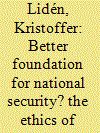

|
|
|
|
|
| Summary/Abstract |
Aiming at analysing all major security risks to a country, comprehensive National Risk Assessments (NRAs) can be used as a foundation for national security policies. Doing so manifests a modernist dream of securing societies through the anticipatory governance of risks. Yet, this dream resembles a nightmare of undemocratic state control in the name of security. Based on a critique of the politics of NRAs, this article offers a theoretical framework for evaluating their scientific and political credentials. Drawing on political theory of technocratic expert rule, ethical criteria of epistemic reliability and political representation are introduced to the debate. These criteria are then applied to an analysis of the NRAs of Sweden, Denmark, Finland, Norway and Iceland. I argue that although these NRAs are convincing correctives to the risk perceptions of politicians and civil society, they are insufficiently reliable and representative for defining the scope and priorities of national security policies at large.
|
|
|
|
|
|
|
|
|
|
|
|
|
|
|
|
| 3 |
ID:
079132
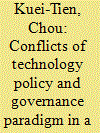

|
|
|
|
|
| Publication |
2007.
|
| Summary/Abstract |
This article discusses the technology policymaking problems associated with the establishment of the Taiwan Biobank. Taiwan, as a late-coming, technology-learning country, is characterized by a hidden and delayed risk culture. In particular, by comparing biotech and industrial policies and GMO (genetically modified organism) risk governance, we can analyze the confrontation involving the state, science experts, and society, which is the result of the authoritarian regime and expert politics that have existed in Taiwan since the Cold War era. We find that none of these factors is conducive to social trust and social support, which are essential for the establishment of a genetic database. This article argues that, in different social and historical contexts, such hidden and delayed risk cultures may have formed in different countries that value technological R&D competition.
|
|
|
|
|
|
|
|
|
|
|
|
|
|
|
|
| 4 |
ID:
111092
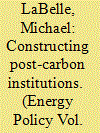

|
|
|
|
|
| Publication |
2012.
|
| Summary/Abstract |
This paper examines three different governance approaches the European Union (EU) and Member States (MS) are relying on to reach a low carbon economy by 2050. Current governance literature explains the operational methods of the EU's new governance approach to reduce carbon emissions. However, the literature neglects to account for the perceived risks that inhibit the roll-out of new low carbon technology. This article, through a novel approach, uses a grounded theoretical framework to reframe traditional risk literature and provides a connection to governance literature in order to assess the ability of EU governance mechanisms to reduce carbon emissions. The empirical research is based on responses from European energy stakeholders who participated in a Delphi method discussion and in semi-structured interviews; these identified three essential requirements for carbon emissions to be reduced to near zero by 2050: (1) an integrated European energy network, (2) carbon pricing and (3) demand reduction. These features correspond to institutionalized responses by the EU and MS: the Agency for the Cooperation of Energy Regulators (ACER); European Union Emission Trading Scheme (EU ETS) and energy efficiency directives and policies integrated into existing MS institutions. The theoretical and empirical findings suggest that governance by facilitation (energy efficiency) fails to induce significant investment and new policy approaches and cannot be relied on to achieve requisite reductions in demand. Governance by negotiation (ACER) and governance by hierarchy (EU ETS) do reduce risks and may encourage the necessary technological uptake. The term 'risk governance' is used to explain the important role governance plays in reducing risks and advancing new technology and thereby lowering carbon emissions in the energy sector.
|
|
|
|
|
|
|
|
|
|
|
|
|
|
|
|
| 5 |
ID:
140393
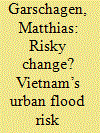

|
|
|
|
|
| Summary/Abstract |
Vietnam’s cities are not only rapidly transforming along with the country’s politico-economic change but are also recognized as being increasingly exposed to natural hazards and the projected impacts of climate change. Resulting are substantial challenges for urban disaster risk governance which, however, remain poorly understood scientifically and underemphasized politically. Against this background, the paper traces the dynamics in urban vulnerability and explores how the responsibilities and capacities for risk reduction and adaptation are issue_image_88_3_Garschagen2negotiated and shared within the country’s changing political economy. Can Tho City, the demographic and economic centre of the highly flood- and typhoon-prone Mekong Delta, serves as an in-depth case study, drawing on 12 months of empirical research. The findings suggest that the transformation process has not only been yielding ambiguous and socially stratified vulnerability effects amongst urban residents; it has also resulted in significant shifts in the way risk management is framed and attributed. Despite the continued paternalistic rhetoric of the party–state apparatus as care-taker, considerable mismatches between state and non-state adaptation action have been found, potentially undermining the effectiveness of both realms. The findings therefore call for a paradigm shift in Vietnam’s urban disaster risk governance. Future approaches need to go beyond the adjustment of physical infrastructure. Rather, the institutional configuration of risk governance itself needs to be adapted in order to mediate and integrate different types of risk reduction measures. These unfold across the increasingly divergent range of urban actors and their interests in terms of spatial scales, temporal scales, normative motivations and capacities.
|
|
|
|
|
|
|
|
|
|
|
|
|
|
|
|
| 6 |
ID:
160452
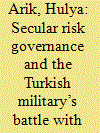

|
|
|
|
|
| Summary/Abstract |
Prior to its currently subservient position to civilian politics, the Turkish military had always had an autonomous position with a strong ideological commitment to safeguard secularism. From the 1980s to the end of the 2000s, the Turkish military played a key role in the construction of political Islam as a form of risk and in the securitization of religion both in the public sphere and within its own structure. This article examines the Turkish military’s security discourse around religion and the Islamic headscarf through the experiences of women in military families, and is based on ethnographic fieldwork conducted in 2011. Looking at headscarf regulations and the everyday life on military bases, it explores how the military governed Islamism as a form of risk in culturally and sexually specific ways. Drawing on critical security studies that approach risk as a form of social governance, the article examines secular risk governance through the lived experiences of women in military families, the regulation of their daily conduct, and the representation of their bodies and sexual identities through dress. Concluding remarks examine the significance of secular risk governance in the post-2010 era.
|
|
|
|
|
|
|
|
|
|
|
|
|
|
|
|
|
|
|
|
|